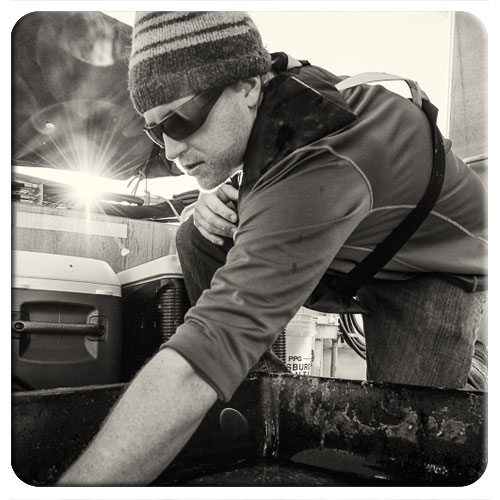Dr. Chris Murray, a 2018 PhD graduate under the guidance of Dr. Hannes Baumann, shared his career journey with current graduate student Samantha Rush.
Samantha: I appreciate you taking the time to do this interview. Can you briefly share some of the highlights from your time at UConn?
Chris: I came to UConn in 2014 joining Dr. Baumann’s lab when he was just starting as a first-year faculty member. My research focused on the effects of climate stressors on fish, particularly in their early life stages. We did experiments exposing fish to climate change stressors like acidification, warming, and hypoxia, which laid the groundwork for many future studies and my work today. At the time, the research was novel, and I got to build the lab alongside Hannes. Avery Point was great for its diversity of undergraduates and young scientists incorporated into research as well as its diversity of research foci from all the different major oceanographic topics.
Samantha: Now, I found that you did your bachelor's in business administration and management. Can you tell me how you made the shift to becoming an oceanography PhD student?
Chris: I was a naive first-generation college student, and when I struggled with biology and chemistry, I just switched to business. By my senior year, I realized it wasn’t for me, but I had matured academically to know what to do to get to the next step and I morphed my business administration degree into environmental science with a capstone project. I still lacked practical science experience though, so the summer before graduate school, I volunteered extensively with local science groups and universities. When contacting graduate programs, many told me I wasn’t competitive for the program, but I found the Marine Policy and Conservation Program at Stony Brook School of Marine Sciences geared towards non-science majors. There, I met Hannes, who was an adjunct professor, and I ended up working with him as a master’s student. It was pure serendipity that I had been there at that moment to get the position! When Hannes moved to UConn, he offered me a PhD position to start his lab, and it was a no brainer! In all, it was a combination of stick-to-itiveness, luck, being in the right place at the right time, seeing opportunities that evolved, and taking advantage of them!
Samantha: After your PhD, what has your career path looked like?
Chris: During my PhD, I applied for a postdoc at Friday Harbor Labs with the University of Washington (UW), but I didn’t get it. However, in the same email, I was offered a 12-month postdoc at the Washinton Ocean and Certification Program to design a project without preconceived notions. I took that and ran! I established awesome collaborations at UW, University of Western Washington, Northwest Fishery Science Center, and USGS Fish Health and Wildlife Center. I did awesome things I never dreamed I would do when I was an undergraduate. It was a risk going out there, but that leap of faith was the most awesome thing I have ever done for my growth.
Samantha: What a cool adventure! So, what’s your current position?
Chris: As my postdoc ended, I was offered a permanent research position at UW, but I had looked for opportunities back east and found that Woods Hole Oceanographic Institute (WHOI) offered a Postdoctoral Scholars Program. Again, I was not selected, but I was also encouraged to write a National Science Foundation Postdoctoral Research Fellowship proposal, which ultimately got funded. Considering I never sold my girlfriend-now-wife to a permanent position in Washington, we moved back east. My postdoc at WHOI was an incredible fellowship opportunity, and once that ended, I applied for tenure track faculty jobs. I had varying success, but WHOI didn’t want to lose me, so I was offered my now permanent research job in biology.
Samantha: I also heard you were recently offered a faculty position at the University of Maryland Center for Environmental Science at the Chesapeake Biological Lab. What led to your decision to decline the offer?
Chris: It was a dream job for me, but my wife and I found out we’re having a baby and our families are here in Cape Cod. We have a lot of ties to this area, so moving away didn’t feel like the right choice for us right now. It’s a tough reality of academic life- being willing to jump around the country to various opportunities- but with everything we have here, it made more sense to stay. I’m confident this won’t be my only opportunity.
Samantha: That is such a thoughtful decision. It is great to hear how you’re balancing career and personal life. So, what advice do you have for current graduate students?
Chris: Seriously consider your long-term plans, especially as you approach the second half of your degree. You can do a lot now to set yourself up for the next step. It’s true that there aren’t millions of jobs, but if you have a sober idea about what you want, taking steps towards it can make transitions smoother. Also, keep in mind that there are still more opportunities available than you can ever appreciate. Even rejected proposals can be reformatted. The endeavor is always really worth it, at least in my experience.
Samantha: Fantastic advice! And just for fun- what do you enjoy doing outside of research?
Chris: Basically, all the outdoor activities- hiking, snorkeling, scuba diving, backpacking, kayaking, fishing. I don’t have all those options on the Cape, but I have more time to enjoy them than I did as a graduate student.
Samantha: That’s awesome! Thanks again for sharing your story and advice, Chris. It was great chatting with you!
